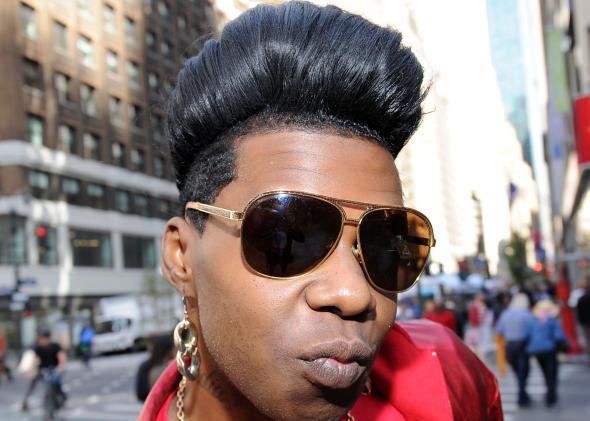RuPaul is America’s most trusted name in drag queens.
She’s always carried herself with a reserved poise (perhaps that comes from an Atlanta upbringing) that’s disarming: No one sees a skinny, middle-aged man in drag. She’s legit: Thirty years of hustling her Charisma, Uniqueness, Nerve, and Talent have made her an actual supermodel, a Billboard-charting singer, and a media mogul. She’s taken seriously as a businessperson in a role that’s historically been played for camp.
Tonight, her reality show, RuPaul’s Drag Race, enters its sixth season on gay TV network Logo, and her sixth album, Born Naked drops today. (“You’re born naked & the rest is drag,” she explains in her Twitter bio.)
But perhaps the most unexpected contribution RuPaul has made with her show and her music is to bring the spectrum of male-to-female performance and femininity into mainstream popular culture.
RuPaul lives as a man and performs as a woman. As such, she uses interchangeable pronouns, as do most of the Drag Race contestants. But the show’s rules don’t specify that a contestant must identify as male, or even queer; there’s no mandate that you can’t have modified your body through surgery. In fact, there have been several genderqueer or transitioning contestants on the show, including Season 3 contestant Carmen Carrera, who recently tried to expand Katie Couric’s understanding of trans identity in an awkward but important interview, along with Orange Is the New Black trans actress Laverne Cox.
Thanks to Drag Race, more people understand that drag queens are performing femininity, and that it’s a long tradition.
Which leads us back to RuPaul, the consummate performer. Her albums have long been where the wheels fly off her regal demeanor. And at 53, she’s got a den-mother image to shed now, too.
Enter Big Freedia, an incredibly talented New Orleans-based trans singer and rapper, known in her hometown for the last decade as “The Queen of Bounce.” We have Freedia and the booty-bounce genre to thank for the twerking revolution we are enduring/enjoying today. (Freedia, too, is free with pronouns; she’s on a trans spectrum and has used both he and she.)
Freedia had been grinding for years with other Southern trans and queer rappers (such as Katey Red) before she broke out with 2010’s Big Freedia Hitz Vol. 1 and the single “Excuse.” (In the video, she tries heroically to teach hipsters to wobbledy-wobble.)
Freedia gained major attention with her guest spot on RuPaul’s 2013 single “Peanut Butter.” The svelte RuPaul had more booty in that video than the world had ever seen, and the lyrics were … well this was a very different lady “spreadin’ that jelly.” Freedia’s voice and delivery—she’s a dance drill sergeant—provided the bounce inspiration and a fresh foil to Ru.
Freedia has her own family-focused reality show on Fuse, which was just renewed for a second season. And today, she is fresh off a tour, on billboards in Times Square, and on the very first track of RuPaul’s new record.
Over the aggressive beats of “Freaky Money,” Freedia announces herself with an unmistakable power, and her parts could dominate the song if she and RuPaul weren’t sisters in experience in so many ways. “Don’t gimme your love/ I don’t want it,” Freedia sings. “I want your money, money, money. … / Make you throw your freaky money in the air.”
There’s a social-change saying, “You must lift as you climb.” The entertainment world doesn’t really work that way, and the space for gender-variant performers in the mainstream has never been large enough to be shared. That’s changing, so shake your ass in celebration.
